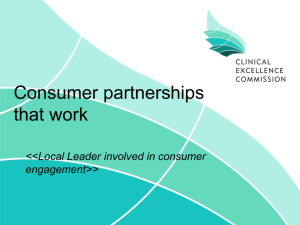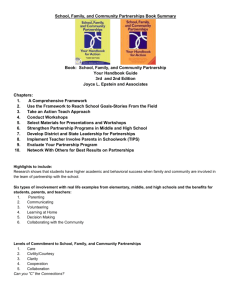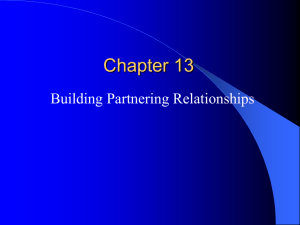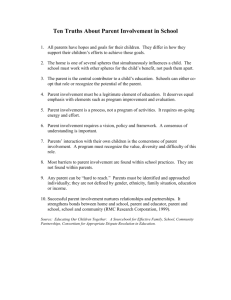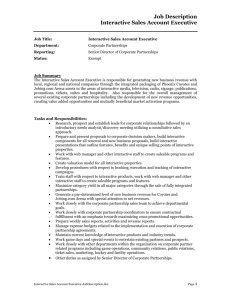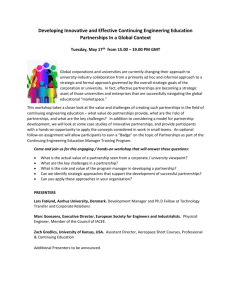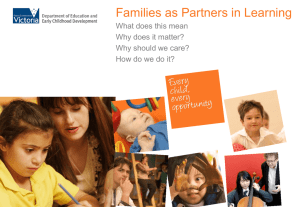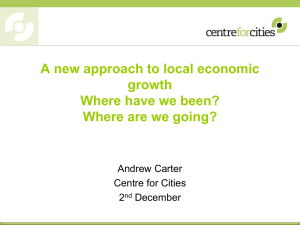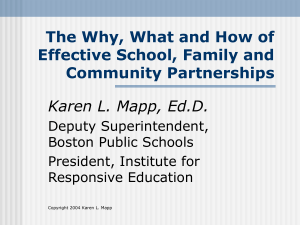PPT - Scholastic
advertisement
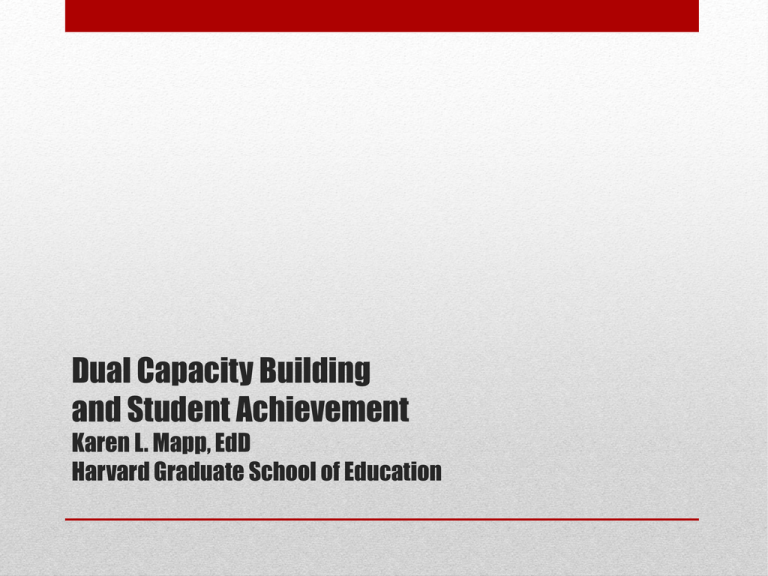
Dual Capacity Building and Student Achievement Karen L. Mapp, EdD Harvard Graduate School of Education New Developments in the Field of Family and Community Engagement • Increased focus on family engagement from philanthropy: Kellogg, Annie E. Casey, and the Packard Foundation • Formation of the National Partnership for Family, School and Community Engagement, with support from the Heising-Simons Foundation • Third USDOE I3 competition • Education Nation to include feature panel on family engagement • NYC Fund for Public Advocacy Forum on Family Engagement, Oct 2013, with support from Scholastic FACE • Changes in state policy: inclusion of family engagement in assessment and evaluation rubrics (For example, MA and NY) • Over 125 members of the IEL based Family Engagement District Leaders Group • More district systemic initiatives • Introduction of the Family Engagement in Education Act in August, 2013 Why the increase in focus on family and community engagement? Perhaps the education sector is finally paying attention to the solid research base shows that how families are engaged in their children’s learning and development matters... ... Family engagement matters Family engagement matters ... for student literacy PISA study on Family Engagement (2010): •Fifteen-year old students whose parents often read books with them during their first year of primary school show markedly higher PISA scores than students whose parents read infrequently with them or not at all (The average difference is 25 score points, which equates to over half a school year). •The performance advantage among students whose parents read to them early in their school years is evident regardless of family’s socioeconomic status. •Students are never too old to benefit from their parents interest in them: Family engagement with their 15-year olds (talking about current events, about school, etc.) is strongly associated with better PISA performance. Family engagement matters ... for student literacy National Center for Family Literacy Study: •A meta-analysis of 14 experimental/quasi experimental studies to determine the causal role of parent actions in children’s literacy development from kindergarten to third grade found that how parents are engaged in their children’s reading acquisition does matter. Family engagement matters ... for social & emotional development •Study by Gonzales-Pienda, et al, found that the more parental involvement:The more positive was children’s academic self-conceptThe higher was children’s tendency to internalize or accept responsibility for the results of their academic behavior. The better were children’s academic aptitudes (verbal, reasoning, and calculus – their speed and precision in performing operations with numbers and quantitative concepts). Family engagement matters ... for school improvement FIVE ESSENTIAL SUPPORTS • The University of Chicago Consortium on Chicago School Research 1. LEADERSHI P as the Driver for Change 2. PROFESSIO NAL CAPACITY CLASSROOM IC 4. STUDENTCENTERED LEARNING CLIMATE 5. INSTRUCTIO NAL GUIDANCE 3. PARENTCOMMUNITY TIES 3. PARENTCOMMUNITY TIES Effective Home/School Partnerships Supporting Student Achievement & School Improvement Why has it been so difficult to cultivate and sustain effective home/school partnerships? effective partnerships? Effective Home/School Partnerships Supporting Student Achievement & School Improvement Limited focus on building the capacity for stakeholders to partner in ways that support student achievement and school improvement School & Program Staff Who Can: • • • Honor and Recognize Families’ Funds of Knowledge Connect Family Engagement to Student Learning Create Welcoming, Inviting Cultures Effective Home/School Partnerships Supporting Student Achievement & School Improvement Families Who Can Negotiate Multiples Roles: • • • Supporters Encouragers Monitors • • • Advocates Decision Makers Collaborators Dual Capacity Building Framework for Family-School Partnerships The Challenge Lack of opportunities for school/program staff to build the capacity for partnership Ineffective Family/Schoo l Partnerships Lack of opportunities for families to build the capacity for partnership Conditions for Success Policy & Program Focus Family and Staff Capacity Outcomes Organizational Conditions •Systemic: across the organization •Integrated: embedded in all programs •Sustained: with resources and infrastructure To build and enhance the capacity of staff/families in the “4 C” areas: School & Program Staff Who Can: • •Capabilities (skills • Process Conditions •Linked to Learning •Relational •Developmental vs service orientation •Collaborative •Interactive • and knowledge) •Connections (networks) •Cognition (beliefs, values) •Confidence (selfefficacy) Honor and Recognize Families’ Funds of Knowledge Connect Family Engagement to Student Learning Create Welcoming, Inviting Cultures Effective Family/School Home/School Partnerships Supporting Student Achievement & School Improvement Families Who Can Negotiate Multiple Roles: • • • Supporters Encouragers Monitors • • • Advocates Decision Makers Collaborators
